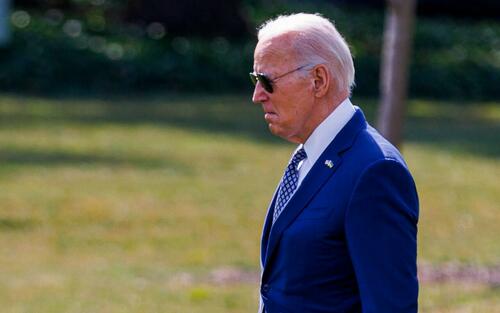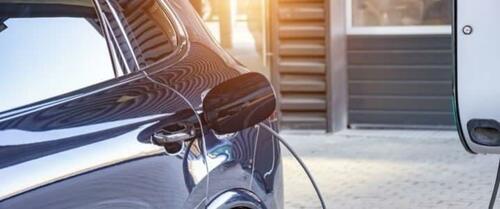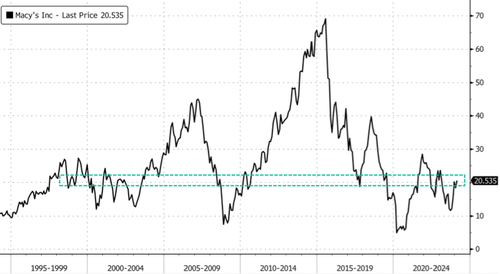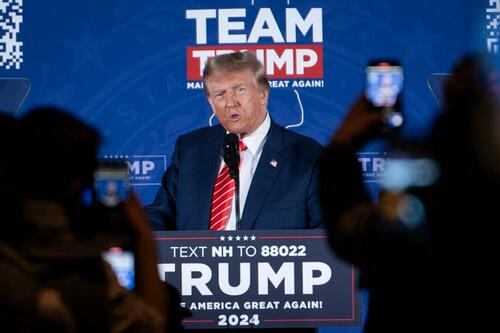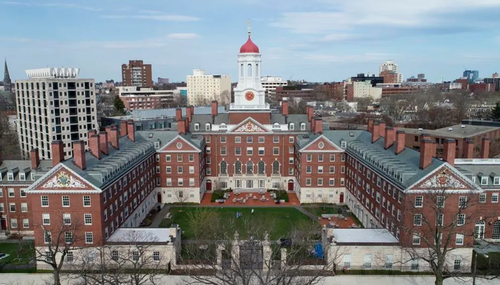Authored by Nikolai Hubble via FortuneAndFreedom.com,
-
When it rains, it pours for those in power
-
Have the people suddenly woken up?
-
How will the Establishment respond?
Our Betters have been very busy these last few years. Climate change, diversity equity and inclusion, ESG, net zero, vaccine rollouts, lockdowns, wars, political scandals, court cases and investigations, causing and then preventing inflation, bank meltdowns, government bond market meltdowns, debanking, sanctions, CBDCs, transgenderism, renewable energy, crypto crackdowns and so much more.
There’s no challenge too big for the powerful. Even the global climate and the definition of a woman is in their control.
But what’s truly striking is that, all of a sudden, things don’t seem to be going according to plan on any of their initiatives. Nobody seems to believe anything they say anymore.
It’s all gone so dreadfully wrong for our Betters.
The Establishment, the Deep State, the Davos crowd, the Elites, the House of Lords, the Globalists, and whoever else you’d like to add to the totalitarian mix – they’re on the retreat, right across the board.
From climate change to migration policy to the economy, if you were to make a list of their pet policies, you could cross them right off again given the news stories coming thick and fast. I’ve never seen so many top-down initiatives flop in such rapid succession.
I mean, I expected net zero to prove problematic. But I thought they’d at least give it a good go. They seem to be giving up at the first hurdle.
There’s probably no need to add insult to injury. But let’s do it anyway by providing a quick summary of what’s unravelling, and then get to why I’m telling you about it.
On the climate change front, it’s all gone so dreadfully wrong. Even the EU is pulling the plug on its own green initiatives. Heck, the German Greens are leading the charge to water down the EU’s green policies.
No prizes for guessing why – the EU’s farmers are up in arms, literally. It’s totally bizarre to see what was the EU’s most coddled interest group, its farmers, rise up against it.
Remembering that the union was originally a protectionist coal and steel trade zone, it’s worth noting that those two groups of workers didn’t exactly kick up half as much of a fuss as they were phased out by their own protectors. But the farmers had other ideas.
The UK was one step ahead of the EU, watering down a long list of climate change policies over the past few months. You’ve heard plenty about all that already.
In central London, Robin Hood and his merry men have been keeping everyday motorists safe from the sheriff by sabotaging his Ultra Low Emission Zone cameras which punish motorists who can’t afford to pay their green taxes or get an EV. “Let them eat cake to avoid the crippling ULEZ charge,” scream the Elites. Or is that bugs?
But what chance have 15-minute cities got if ULEZ faces this much opposition?
The German government, green virtue signallers extraordinaire, have upped their game from transitioning back to coal by felling windmills. Instead, they now want to fill the gap left by shutting down carbon-emission-free nuclear power with billions of euros of new gas power stations.
To be fair, the idea is that they will be converted to hydrogen at some point in the future. With the hydrogen produced… somewhere, somehow, by someone using something other than nuclear power.
The announcement out of Germany was, of course, carefully timed for an announcement from the US to freeze approvals of new natural gas exports. Cue what must have been a truly bizarre diplomatic spat, with the Europeans complaining that the Americans weren’t exporting enough fracking fossil fuels to support the green energy transition. I mean, what was Nord Stream 2 blown up for?
It’s like an episode of Hogan’s Heroes.
In Australia, a landmark wind farm was hung out to dry by the government over environmental damage it would’ve done to a wetland. To be fair, we’ll have a lot more wetland should climate scientists be right about climate change. But it leaves everyone wondering what sort of power is permissible in a world where the environment comes first. And it’s not like fossil fuels will be kept online for a lack of renewables… or will they?
Even if we did decide to build a green energy system, we still haven’t figured out where the metal will come from. The German government has walked back EU plans to ensure that the metals used in the energy transition are sustainably sourced. In a truly bizarre twist of fate, it’s the Australian mining billionaire Andrew “Twiggy” Forrest who is complaining about it.
What sort of bizarre world do we live in where Australian mining magnates complain about the lack of green regulation coming out of the EU!? And what will the EU shift do to investment in sustainably sourced metal in the future?
Not that the EU needed to add to the existing damage there. The Australian Financial Review newspaper recently had this headline: “Rich List fortunes gouged by green metals slump”. The idea is that those who invested in green metals projects in Australia have lost a fortune, literally.
One executive responded to his stock losing 52% as only a green dream believer could: “I’m not really wealth motivated to be honest.” I wonder if his shareholders are pleased to hear this.
Capitalism’s greatest strength is that it acts as an accountability mechanism. It forces people to put their own money where their mouth is and parts the gullible from said money if the scheme was never going to work.
That’s why car rental companies are trying to offload their EVs at an eyewatering pace. They’re not just refusing to buy more. And they’re not selling them off slowly to avoid crashing the market either. They’re running for it, presumably because the cars won’t take them where they need to go.
The environmentalists are getting so desperate in their plan to save the planet that they’re turning on the world’s cutest animals to try and save it. I don’t know whether to laugh or cry at this Telegraph headline: “Squirrels will be chemically castrated and deer will be culled, cooked and served to prisoners under net zero plans to protect England’s trees.”
My first thought was to ask what Australia will do? They don’t have any squirrels to cull to save the planet. And the last time the country had a war on Emus, it lost.
Ironically enough, not so long ago, it was trees that were getting vilified over climate change, with Ohio State News complaining, “Climate change is turning the trees into gluttons,” and theories that trees only temporarily sequester carbon because they eventually die off and release it all again. If trees were to live 26 years, those planted today would wreak havoc on our 2050 net zero goals by dying off…
So, for climate change activists, it’s difficult to tell whether squirrels or trees are the real villains in the story of stopping human caused climate change. Why not go after both?
What we do know is that the targets we set ourselves in the fight against climate change are falling left right and centre. The Renewable Energy Magazine reports, “UK solar target for 2035 obliterated by inflated costs and gridlock.” The French have dropped their renewable energy targets. Bloomberg reports, “California’s ‘Ambitious’ Offshore Wind Goal Seen as Unachievable,” and they’re being polite about it. Fossil fueller Shell calculated in its report on liquefied natural gas (LNG) that the world could fall miles short of net zero because of booming gas demand.
Governments are responding to this shortfall in style. The Labour Party plans to cut its green investment pledge by half…
The current government’s much publicised easing of onshore wind farm regulations have resulted in a grand total of zero new onshore wind turbine project applications, a bit like that offshore wind farm auction we had last year.
The world’s leading wind energy companies are running for the hills, with Orsted and Siemens Energy both shuffling their way out of the wind industry.
EVs, the pride and joy of the environmental movement, are struggling in a surprisingly long list of ways. Even the sceptics couldn’t have come up with such a list. Their share of sales, their ability to move in cold weather, their ability to retain value and plenty more is accumulating into a rather large embarrassment. China’s EV graveyards are in the news, drawing allusions to the ghost cities of a decade ago.
Never afraid to take the moral high ground, the UK’s House of Lords found someone to blame for the EV disappointment: Mr Bean. Apparently he had given EVs a bad review.
It’s of course beautifully ironic that EVs don’t work in the sorts of weather conditions that climate change makes more likely, or less likely, but still rather prevalent, depending on which climate change activist you’re listening to.
More and more governments are abandoning bizarre policies to promote EVs as their various shortfalls and links to China become ever more obvious. The same goes for other vanity projects like heat pumps, electric boilers and more.
Soon the scandals will emerge. Things like the thousands of households in Spain that were left high and dry by the government after overinvesting in solar power based on subsidy promises that evaporated.
Nuclear power, the painfully obvious solution to all this, is becoming ever more difficult to ignore. But that just makes the attempts to ignore it ever more unhinged. The EU is implicitly demanding the French shut down nuclear power to increase the share of renewables on their grid to the EU target of 40%…
But it’s not just climate change that is falling apart for the Globalists. It’s everything else too.
Russian sanctions are proving to be laughable as the Houthis manage to disrupt more shipping than the Western world’s combined efforts against Russia, and Western exports to Russia’s neighbours just happen to go berserk.
Good reason to add more sanctions then, isn’t it? This time for the death of a jailed Russian opposition leader.
While Tucker Carlson is reporting from Moscow about their lavish subway stations and cheap food, Western economies are in or skirting recession.
The only thing that does seem to be going in favour of the Establishment is the stock market. On the days recessions were announced in the UK and Japan, for example, stocks in both places rallied healthily.
That’s because, these days, the only thing keeping markets alive is government and central bank intervention. And recessions make more intervention more likely.
But is that really the basis of a sustainable rally? And what does it do to society to see stocks go up on the misery of everyone else?
Inflation is proving to be “sticky” in many places, just when central bankers were ready to declare victory. Some are even threatening to hike interest rates again, instead of cutting as the markets demand! If the markets are wrong, stocks could plunge.
Facing this difficult situation, the European Central Bank is behaving like my four-year-old who runs around Kindy telling everyone, “You’re not my best friend any more!” One of the ECB’s governors recently said this about those who see the ECB’s climate change agenda as being contrary to its legal mandate: “I don’t want these people anymore.” You know what? We don’t want you either.
The verdict on pandemic era policies are growing increasingly embarrassing, putting all other Globalist mandate plans at risk. Masks, social distancing and lockdowns are viewed by many as debunked, the origin of the virus is looking ever more likely to have been manmade, and vaccines are proving rather unpopular. Sometimes, even government policymakers are the obvious.
In the US, the sitting president, for he can barely stand, has been described as too senile to stand trial for the same crimes that his opponent is sitting trial for. The crime would seem to qualify you for president though, given the response from both supporter’s camps about their own candidate’s performance. But then there’s Hillary Clinton, who also mishandled classified information, but didn’t win an election for it.
With Donald Trump leading polls, the Democrats’ new plan is very American: import voters from overseas. But the consequences of opening borders seem to be costing the Democrats more voters than they can gain. Those who argued for open borders and defunded police are begging the police to remove the migrants on their doorsteps.
Indeed, the mass migration policies which voters associate with the Globalists, because no national government that expects to be held to account at the ballot box would approve them, are triggering protests in some of the most welcoming nations I’ve ever migrated to.
I lived in Austria when the Syrians arrived in 2015. I lived in Ireland before Schengen opened the country to mass migration and visited again several times after. I lived in Germany and the UK when the EU established freedom of movement and the right to reside. I lived in Australia when Tony Abbott’s campaign against illegal immigration began and when the country was flooded with economic migrants from Europe after 2008. Let me tell you, perfectly ordinary people are furious about the current surge in migration. They must have taken a turn for the far right…
Most damning of all are of course the excess deaths figures which continue to bubble away without any government panic, let alone investigation. If only someone would model the deaths instead of reporting on actual ones, then something would be done about it. For now, it’s left to the conspiracy theorists to ponder what’s behind them. And they are getting ever closer.
To be honest, the collapse of these supranational policies is happening so fast it resembles the end of every Star Wars movie, when two hours of accumulated problems and challenges suddenly evaporate in one fell victorious swoop of a spaceship, leaving no loose ends to worry about. But there always has to be another sequel, right?
The collapse of so many campaigns has been very amusing, especially for the people who manage to avoid the disastrous consequences of all the government policies gone wrong. It’s not so funny for German factory workers who burn wood to keep warm in winter as their employer moves to Texas or China. Nor for the Irish who can’t go to their favourite pub for fear of being mugged.
I’m moving to Japan in two weeks, where a lot of this chicanery simply doesn’t fly. And my Japanese isn’t good enough to understand what sort of nonsense the local politicians get up to instead. But, let me tell you, they know what a woman is.
For those of you stuck living in a Western democracy, especially in Europe, the consequences are plain to see. People are taking to the streets and abandoning the mainstream political parties like it matters who you vote for. This is where things get dangerous.
A 2022 survey found trust in government in the EU had fallen from 4.7 out of 10 to 3.6. Can you imagine what it is at now?
For those of you who feel vindicated by all the changes happening around you, don’t. Because they aren’t finished with you yet.
I want to raise the old mantra about dangerous and being cornered. It applies to our leaders, including the ones behind the curtains. Can they really stomach such a defeat across the board without raising the stakes? Or are we going to discover a new disease, asteroid, or social cause imminently to justify a new round of eye-watering government intervention in our lives?
What would you do if you were Klaus Schwab and your agenda began to melt away?
Do the do-gooders slink back into their Swiss caves, universities and think tanks whence they came? Do they give up on trying to engineer the world?
Or do they turn to more drastic measures to keep you in line?


